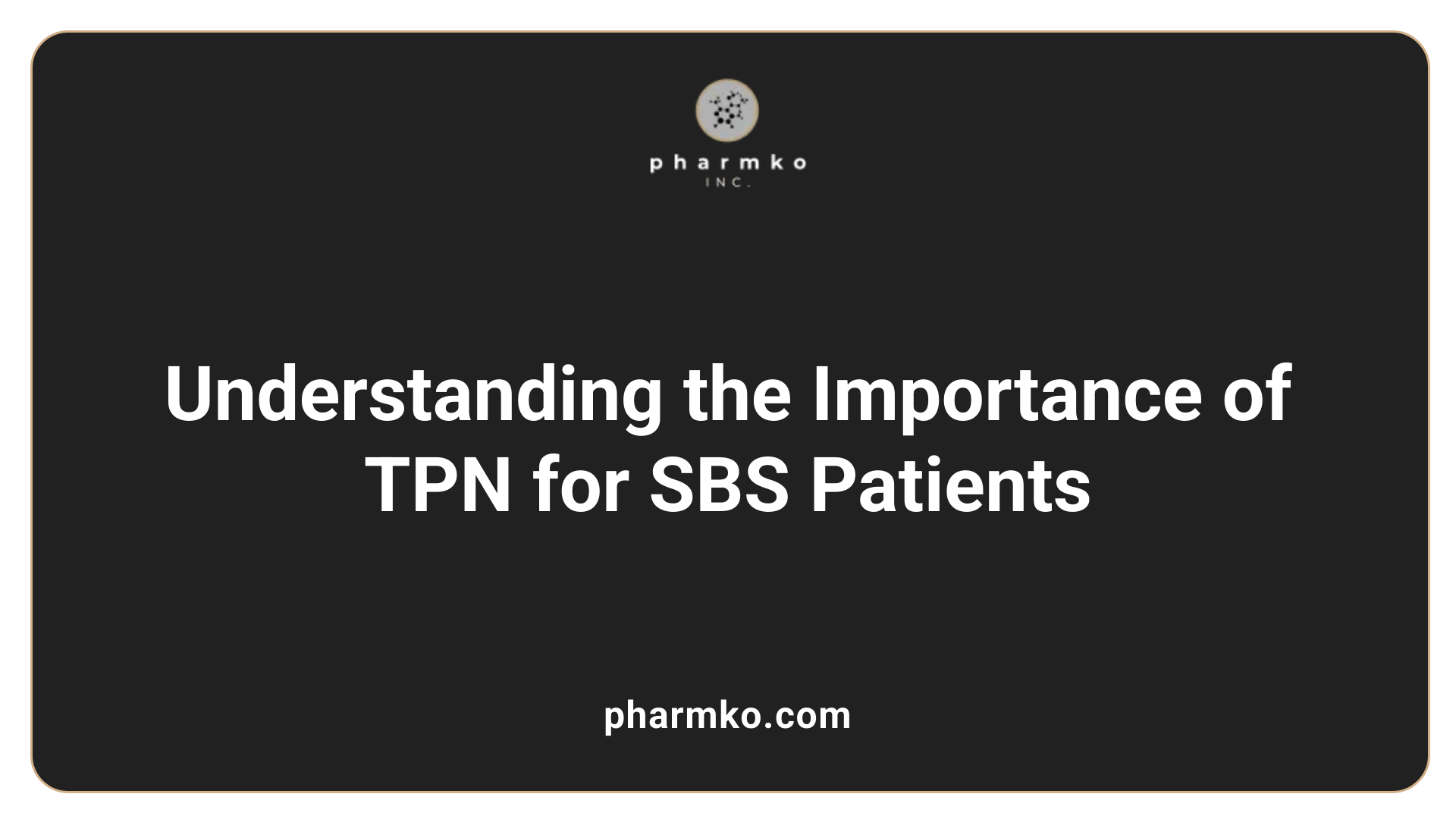How TPN Supports Women with Short Bowel Syndrome

Understanding Short Bowel Syndrome in Women
Short Bowel Syndrome (SBS) is a challenging condition predominantly affecting individuals who have undergone significant intestinal surgeries, resulting in the dramatic shortening of the small intestine. This leads to severe malabsorption issues and nutrient deficiencies. Among the strategies employed to manage SBS, Total Parenteral Nutrition (TPN) stands out as a critical intervention, particularly for women, who often experience unique physiological challenges related to this condition. TPN plays a pivotal role in ensuring women with SBS receive necessary nutrients, supporting survival and enhancing quality of life. This article delves into the multifaceted role of TPN, exploring its benefits, mechanisms, and the integrative strategies supporting women coping with SBS.
The Role of TPN in SBS Management

What role does Total Parenteral Nutrition (TPN) play in managing Short Bowel Syndrome (SBS)?
Total Parenteral Nutrition (TPN) is crucial for patients with Short Bowel Syndrome (SBS) as it provides essential nutrients directly into the bloodstream, bypassing the need for intestinal absorption. This is particularly important for maintaining nutritional status, preventing malnutrition, and improving the quality of life for those with SBS, especially when oral or enteral nutrition is insufficient.
Patients with SBS often face severe nutrient deficiencies, dehydration, and malabsorption issues. TPN supplies vital nutrients, including proteins, carbohydrates, fats, vitamins, and minerals, customized to meet individual needs. As a long-term solution, TPN enables individuals to sustain their health and growth when their remaining intestines cannot absorb adequate nutrition through normal dietary means.
Additionally, the early initiation of TPN in patients post-surgery helps in achieving a positive nitrogen balance, essential for recovery. Many patients, particularly children, start with high levels of TPN due to significant malabsorption, gradually decreasing their dependency as they achieve intestinal adaptation.
| Aspect | Impact of TPN on SBS Management | Details |
|---|---|---|
| Nutrient Supply | Direct intravenous nourishment | Provides essential nutrients bypassing the gut |
| Long-term Solution | Vital for chronic cases | Supports nutritional needs when enteral nutrition is insufficient |
| Quality of Life | Significant improvement reported | Reduces complications and bolsters health maintenance |
Medically supervised TPN is critical in helping patients manage their condition effectively and can be life-saving when done properly. This underscores the importance of ongoing monitoring and support from healthcare providers to optimize the approach as intestinal adaptation progresses.
Therapeutic Strategies for Managing SBS

What therapeutic strategies are used to manage Short Bowel Syndrome (SBS)?
The management of Short Bowel Syndrome (SBS) involves a multifaceted approach to maintain nutritional status and prevent further health complications. Initially, many patients depend on long-term parenteral nutrition (TPN), which delivers essential nutrients and fluids directly into the bloodstream. This is crucial for those unable to absorb adequate nutrients through their remaining intestine due to malabsorption.
Once the patient stabilizes, clinicians often consider transitioning to enteral nutrition (EN). This can be particularly effective after any underlying complications, such as intestinal blockages, are resolved. Introducing enteral nutrition helps stimulate the bowel, enhancing its function and absorption capacity.
How do surgical interventions play a role?
Surgical options may also be explored for patients struggling with SBS. Procedures such as bowel-lengthening techniques or even intestinal transplantation can be life-saving for those with severe conditions. These interventions aim to maximize the remaining gut functionality and improve nutrient absorption.
What about emerging therapies?
In addition, emerging therapies like teduglutide, a GLP-2 analogue, offer promising avenues for treatment. This medication has been shown to enhance intestinal absorption significantly and help reduce dependency on parenteral nutrition for some patients.
By combining these approaches—TPN, EN, surgical options, and innovative therapies—patients with SBS can improve their quality of life and nutritional status while minimizing complications associated with the syndrome.
Hydration Strategies for Women with SBS

How can individuals with Short Bowel Syndrome stay hydrated?
Staying hydrated is a critical aspect for individuals with Short Bowel Syndrome (SBS), especially since this condition often leads to chronic diarrhea and fluid loss. One effective hydration strategy involves the use of Oral Rehydration Solutions (ORS). These solutions are specially formulated with salt, sugar, and water to enhance fluid absorption, making them beneficial even during periods of diarrhea.
It's essential for people with SBS to adopt personalized nutritional management, which may include modifications based on the length of the remaining bowel. To enhance both hydration and nutrient absorption, it is recommended that individuals consume small amounts of fluids throughout the day. Limiting fluid intake during meals can further optimize nutrient absorption.
Dietary adjustments to promote hydration
In addition to ORS, individuals are advised to avoid consuming concentrated sweets, alcohol, and certain high-oxalate foods that could worsen their gastrointestinal symptoms. Also, maintaining emergency plans for hydration needs is paramount. This includes ensuring easy access to medications and rehydration solutions in case of significant fluid loss.
With proper hydration strategies and dietary adjustments, individuals with SBS can better manage their symptoms while promoting overall health.
Managing Bowel Movements on TPN

How do patients with Total Parenteral Nutrition (TPN) manage bowel movements?
Patients with Total Parenteral Nutrition (TPN) can manage bowel movements despite not consuming food orally. TPN provides essential nutrients directly into the bloodstream, bypassing the gastrointestinal tract. However, the body continues to produce digestive fluids and shed old cells, resulting in bowel movements, although these often occur less frequently than in individuals with a healthy digestive system.
Some TPN patients may be allowed to eat small amounts of food, depending on their specific medical condition. This limited intake can influence bowel habits, making them somewhat variable. Each TPN regimen is tailored to meet individual nutritional needs, and its effects on bowel activity can differ based on the patient’s health status and the length of their remaining intestine.
Overall, while TPN is crucial for delivering nutrients and maintaining health in patients with severe short bowel syndrome or other conditions causing malabsorption, some bowel activity continues due to the body’s natural physiological processes. This ongoing function showcases the adaptability of the gastrointestinal system, even when it is not being used in a conventional manner.
Intestinal Adaptation and Rehabilitation
Process of intestinal adaptation
Intestinal adaptation is a crucial process for patients with short bowel syndrome (SBS) following surgical resection. After losing significant lengths of their intestine, patients' remaining bowel segments undergo physiological changes that enhance nutrient and fluid absorption. This adaptation can take up to two years post-surgery, significantly impacting the patient's nutritional status and dependence on Total Parenteral Nutrition (TPN). During this phase, the small intestine may enlarge in length and the functional surface area may increase, improving the body's ability to absorb essential nutrients more effectively.
Bowel rehabilitation techniques
Effective bowel rehabilitation encompasses a combination of dietary management and medical interventions. For instance:
- Dietary Management: Patients are often guided to incorporate small, frequent meals to optimize nutrient absorption while minimizing gastrointestinal distress.
- Medical Treatments: Combining traditional TPN with therapies such as recombinant human growth hormone (rhGH) and glutamine (GLN) may temporarily enhance nutrient absorption, leading to decreased TPN reliance in some patients.
- Rehabilitation Programs: Facilities like the Intestinal Rehabilitation and Nutrition Support program provide comprehensive care tailored to individual needs, emphasizing personalized nutrition plans.
Dietary management in SBS
Implementing a nutrient-dense and easily digestible diet is paramount. Key recommendations include:
- Increasing intake of soluble fiber to support bowel function
- Focusing on nutrient-dense foods, such as lean proteins and complex carbohydrates
- Monitoring vitamin and electrolyte levels closely, ensuring functions like energy production and bone health are supported.
Patients may also need to avoid certain foods that could trigger adverse symptoms, emphasizing the need for individualized dietary strategies in their rehabilitation journey.
Long-term Use and Challenges of TPN
Complications of long-term TPN
Long-term Total Parenteral Nutrition (TPN) can significantly aid patients with Short Bowel Syndrome (SBS) by supplying essential nutrients directly into the bloodstream. However, this approach is not without its risks.
Some common complications associated with prolonged use of TPN include:
- Infections: Central line-associated bloodstream infections are a major concern due to the need for intravenous delivery.
- Liver Disease: Extended TPN usage can lead to liver-related issues, often referred to as TPN-associated liver disease.
- Kidney Problems: Electrolyte imbalances and renal complications may arise from the specific nutrient formulations used in TPN.
- Metabolic Bone Disease: Long-term reliance on parenteral nutrition can contribute to deficiencies in essential minerals, leading to osteoporosis or osteomalacia.
Monitoring and consultation requirements
Given the potential for serious complications, close monitoring and coordination with healthcare providers are crucial. Regular evaluations involving:
- Nutritional Assessment: Follow-ups to adjust nutrient composition based on ongoing absorption efficacy.
- Laboratory Tests: Monitoring liver function, kidney function, and vitamin/mineral levels to quickly address any deficiencies or imbalances.
- Multidisciplinary Team Consultations: Involving dietitians, gastroenterologists, and other specialists to optimize care and ensure a holistic approach to managing SBS can be pivotal in making informed adjustments to TPN therapy.
Home Parenteral Nutrition for Women with SBS
Benefits of home TPN
Home parenteral nutrition (HPN) is a pivotal treatment for women with short bowel syndrome (SBS), allowing for the direct delivery of essential nutrients into their bloodstream. This method bypasses the gastrointestinal tract, which is crucial for patients unable to absorb adequate nutrients following extensive bowel surgeries. HPN enhances nutritional intake and supports hydration, essential for maintaining energy levels and preventing nutrient deficiencies.
Impact on quality of life
The introduction of HPN has significantly improved the quality of life for many SBS patients, reducing the frequency of hospital visits and potential complications related to catheter use. Individuals report increased independence and better management of their health, as they can receive ongoing nutrition support at home. Furthermore, successful management can lead to a stable weight and improved overall health status, facilitating a more active lifestyle.
Role of specialized providers
Providers like Nutrishare play a critical role in home TPN management. They offer tailored nutrition plans and support, ensuring that patients receive the precise nutrients needed for recovery and adaptation. Registered dietitians specializing in such therapies contribute by providing individualized dietary guidance, monitoring nutritional intake, and adjusting HPN plans as needed. This collaborative care model emphasizes the importance of addressing the unique nutritional challenges faced by women with SBS.
Nutritional Support and Dietary Strategies
Dietary Guidance
Managing short bowel syndrome (SBS) demands personalized dietary strategies that adapt to each patient’s unique condition. Patients, particularly women with SBS, often face ongoing nutritional challenges that necessitate tailored dietary plans.
Importance of Nutrient-Dense Foods
Nutrient-dense foods are essential for maintaining optimal health in individuals with SBS. Recommendations typically include:
- Lean proteins: Important for tissue repair and muscle maintenance.
- Complex carbohydrates: Serve as a primary energy source.
- Healthy fats: Needed for overall health but should be limited based on individual tolerance.
- Fruits and vegetables: Provide necessary vitamins and minerals to support overall well-being.
Patients are advised to consume these foods in small, frequent meals to enhance nutrient absorption, mitigate gastrointestinal symptoms, and maintain hydration without overwhelming the system.
Role of Registered Dietitians
Collaboration with registered dietitians experienced in SBS is crucial. These professionals can offer:
- Tailored meal planning to meet specific nutritional needs.
- Ongoing monitoring of vitamin levels and dietary intake to prevent deficiencies.
- Support in adjusting diets to promote effective nutrient absorption and gut adaptation.
Incorporating these strategies supports the transition from dependency on parenteral nutrition while improving the overall quality of life for those with SBS.
Transitioning from TPN to Enteral Nutrition
Factors Influencing Successful Transition
The transition from Total Parenteral Nutrition (TPN) to enteral nutrition is an important goal for patients with Short Bowel Syndrome (SBS). Several factors can influence the success of this process. The length of the remaining bowel plays a significant role; longer segments can enhance nutrient absorption, facilitating a smoother transition. Additionally, the condition of the remnant intestine, including the presence of the ileocecal valve, is crucial for digestion and absorption.
Role of the Remaining Bowel
The remaining bowel's adaptability to absorb nutrients significantly impacts how well patients transition from TPN. As patients progress in their treatment, the adaptation of the intestine can lead to improvements in absorption capabilities, allowing some individuals to move away from parenteral support entirely. This adaptation phase can last up to two years post-surgery, so continuous monitoring is essential.
Dietary and Nutritional Management
Dietary adjustments are vital when transitioning to enteral feeding. Patients are often advised to consume smaller, more frequent meals and include nutrient-dense foods rich in soluble fiber. Close collaboration with registered dietitians allows for personalized meal planning, ensuring that patients maintain adequate nutrition. Avoiding high-fat and overly fibrous foods can prevent exacerbation of symptoms, enhancing the success of the transition to oral or tube feeding.
Clinical Evidence on TPN Effectiveness
Clinical studies and outcomes
Numerous clinical studies confirm the effectiveness of Total Parenteral Nutrition (TPN) for patients with Short Bowel Syndrome (SBS). A recent study involving thirty-nine patients indicated that continuous TPN was crucial for managing nutritional needs post extensive small bowel resection. Notably, the research revealed a significant correlation between the length of the remaining bowel and the duration of nutritional support needed. This finding highlights the potential for personalized TPN protocols tailored to an individual’s anatomy.
Impact on quality of life
The introduction of TPN has a profound impact on the quality of life for those suffering from SBS. Improved nutritional status often leads to better weight maintenance and elevated serum albumin levels, as evidenced by a study showing that thirty-three out of thirty-eight patients managed to achieve these improvements. Rehabilitation initiatives empower patients to potentially wean off TPN, facilitating a shift toward normal dietary intake and enhancing overall well-being.
Patient case studies
One compelling case is that of a child born with gastroschisis who initially required up to seventeen hours of TPN daily. Over time, focused nutritional management allowed her to reduce that to ten hours, three nights a week. This transition signals not only a significant health improvement but also illustrates the potential of individualized TPN therapy combined with behavioral dietary changes. Such stories emphasize the critical role of TPN in managing SBS and promoting recovery.
Psychosocial Impacts of TPN Dependency
Emotional Health Challenges
The journey of managing short bowel syndrome (SBS) while relying on total parenteral nutrition (TPN) can significantly impact emotional health. Many patients experience anxiety and depression related to their dependency on medical nutrition support. The physical limitations and dietary restrictions imposed by TPN can contribute to feelings of isolation and frustration.
Community and Support Networks
For individuals affected by SBS, finding support is essential. Engaging with others who share similar experiences can provide comfort and understanding. Online forums, local support groups, and healthcare networks can foster connections, which help patients navigate the emotional terrain of living with a chronic condition.
Organizations Supporting Women with SBS
Organizations like Girls with Guts offer valuable resources specifically for women facing challenges associated with inflammatory bowel disease and related syndromes, including SBS. These groups promote self-advocacy and facilitate the development of supportive communities, enabling women to find camaraderie and share coping strategies. Building connections can enhance resilience and empower individuals to address their unique health challenges.
| Aspect | Description | Importance |
|---|---|---|
| Emotional Health Challenges | Issues like anxiety and depression | Essential for overall well-being |
| Community Networks | Support from peers and healthcare groups | Reduces feelings of isolation |
| Supporting Organizations | Groups like Girls with Guts provide specific resources | Offer community, advocacy, and coping strategies |
Emerging Treatments and Research Directions

What is the potential of growth hormone therapy?
Research into growth hormone therapy for patients with short bowel syndrome (SBS) shows promising results. A clinical study found that when combined with dietary adjustments and glutamine, growth hormone can lead to notable improvements in nutrient absorption. Specifically, the therapy brought about a 39% increase in protein absorption and reduced stool output by 33%. In this study, approximately 40% of participants managed to maintain their nutritional needs without TPN after treatment, indicating a successful outcome that may pave the way for broader applications of this therapy.
What other treatments are under investigation?
Additionally, the glucagon-like peptide-2 (GLP-2) is being studied for its role in enhancing nutrient absorption. GLP-2 can help maintain the structure and function of the intestine, assisting in better nutrient uptake. Current investigations are focused on understanding its long-term efficacy and safety among SBS patients, as enhanced absorption could significantly improve their quality of life.
What future research areas are crucial?
Future research should aim to explore the efficacy of these treatments in conjunction with traditional management strategies. This includes examining personalized nutrition protocols based on individual patient anatomy. Long-term studies on the effects of home parenteral nutrition, along with ongoing dietary management, will be essential in determining new treatment pathways. Engaging with community support systems specific to SBS can also play a key role in improving patient outcomes, encouraging further exploration into holistic patient care strategies.
Unique Considerations for Pregnant Women with SBS
Nutritional requirements during pregnancy
Pregnant women with short bowel syndrome (SBS) face unique nutritional challenges. Ensuring adequate intake of essential vitamins and minerals is paramount, as deficiencies can impact both maternal health and fetal development. Nutrients such as folic acid, vitamin D, calcium, and iron are particularly crucial to support a healthy pregnancy. Women may need tailored dietary plans that focus on nutrient-dense foods and frequent, smaller meals to maximize absorption.
Challenges and management strategies
Managing SBS during pregnancy can be complicated by gastrointestinal symptoms such as diarrhea and malabsorption, which may exacerbate nutrient deficiencies. Collaborating with a registered dietitian can help in creating effective management strategies. This can include monitoring hydration and electrolyte balance, adjusting food textures, and considering the timing of meals closely to optimize digestive function. Women might also need to avoid foods that can trigger symptoms, ensuring comfort and nutrient stability.
Role of TPN during prenatal care
In cases where oral intake is insufficient, total parenteral nutrition (TPN) can be a crucial support system. TPN provides essential nutrients directly into the bloodstream, bypassing the digestive tract, which helps pregnant women with SBS maintain their health and that of their baby. Monitoring is necessary to adjust TPN as the pregnancy progresses, ensuring the right nutrient profile is consistently provided to meet changing needs.
Concluding Remarks on TPN's Role
Total Parenteral Nutrition (TPN) provides a vital lifeline for women living with Short Bowel Syndrome (SBS), offering essential nutritional support and a significant improvement in quality of life. While TPN has its challenges, advancements in individualized care and home nutrition services have revolutionized management strategies, allowing many women to stabilize and improve their health outcomes. With continued research and innovations, TPN's role in managing SBS will become even more effectual, contributing to the holistic well-being of women facing this difficult condition.
References
- Total parenteral nutrition needs in different types of short bowel ...
- Effects of bowel rehabilitation and combined trophic therapy on ...
- [PDF] Medical Nutrition Therapy for Short Bowel Syndrome
- [PDF] Short Bowel Syndrome and Crohn's Disease
- Managing Short Bowel Syndrome - Diet & Oral Rehydration Solution
- [PDF] The Clinician's Guide to Short Bowel Syndrome
- Expert Home TPN Solutions for Short Bowel Syndrome (SBS)
- Short Bowel, Big Life for Adopted Girl
- Short Bowel Syndrome Causes & Treatment | GATTEX® HCP




































































































